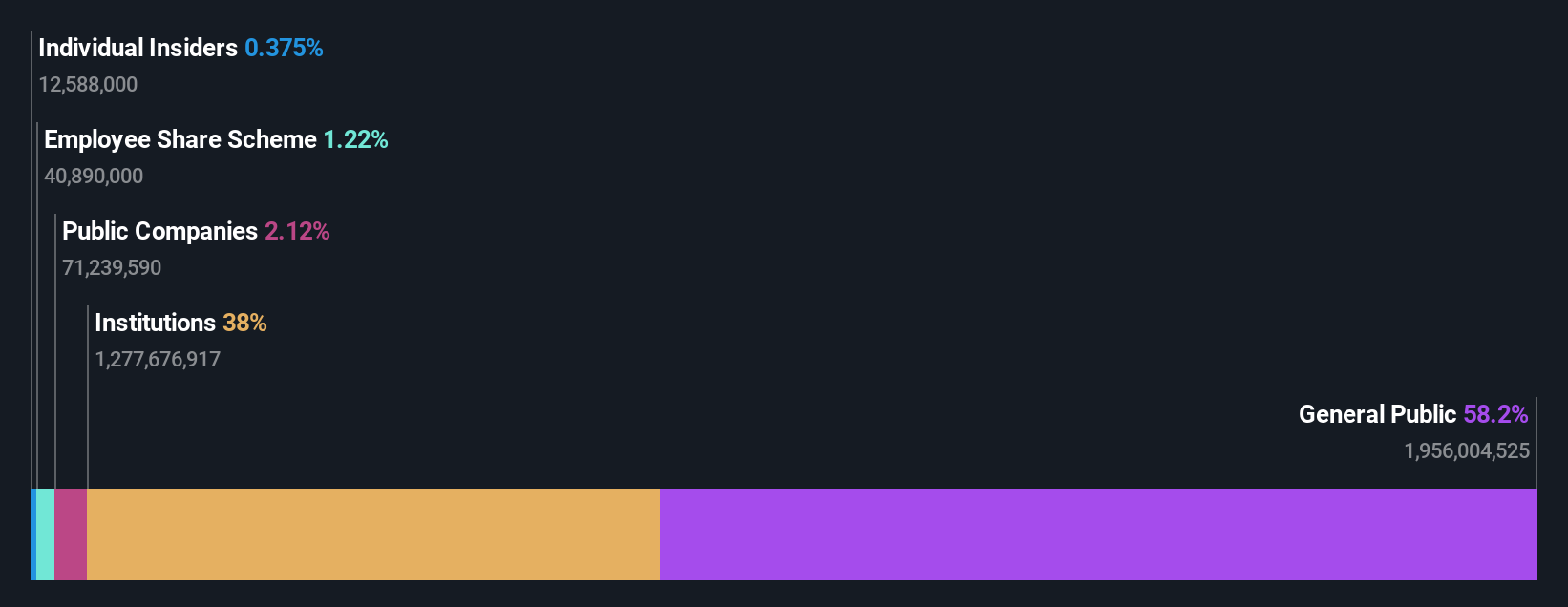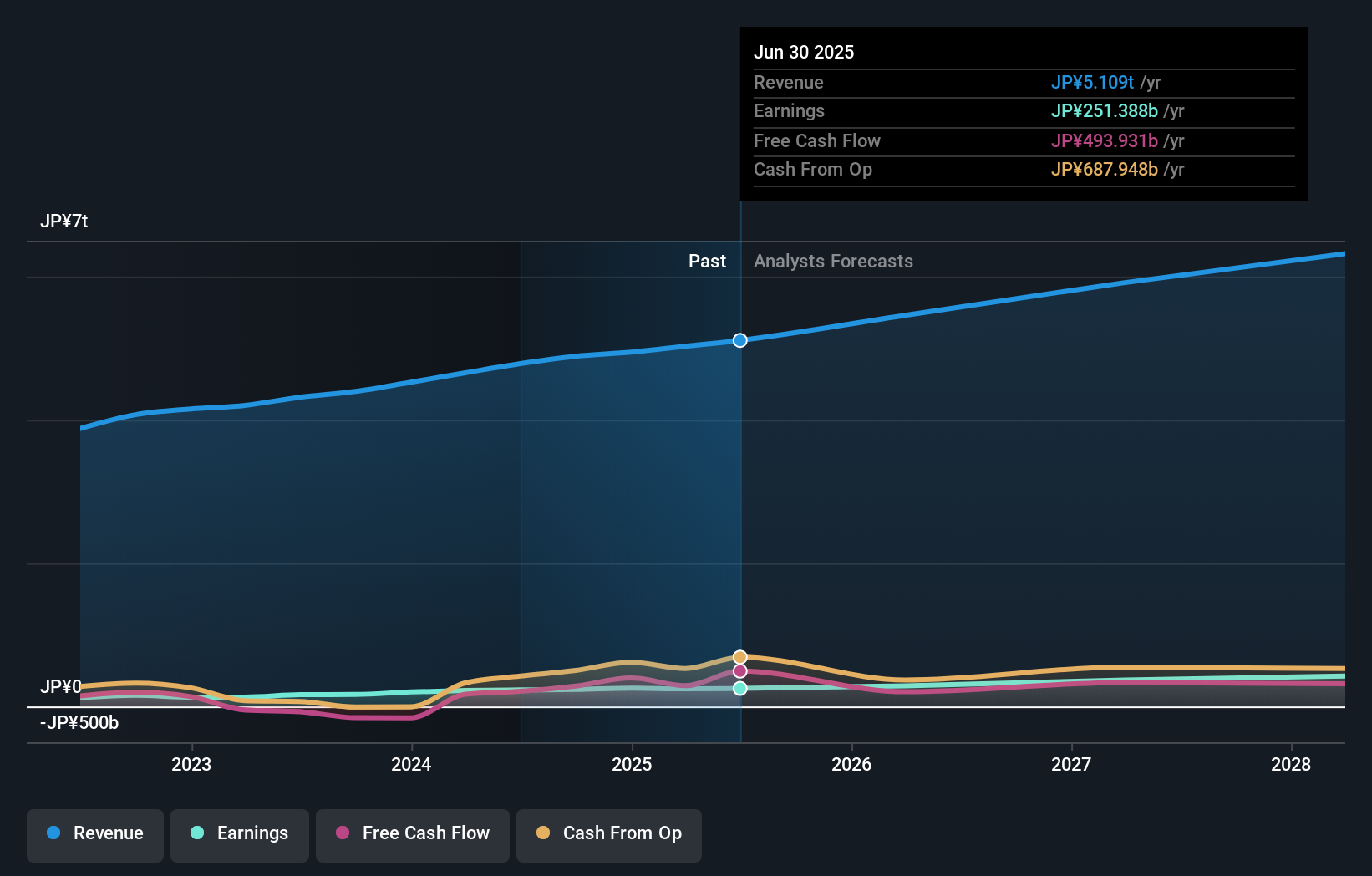Mitsubishi Heavy Industries, Ltd.'s (TSE:7011) top owners are individual investors with 58% stake, while 38% is held by institutions
Key Insights
- Mitsubishi Heavy Industries' significant individual investors ownership suggests that the key decisions are influenced by shareholders from the larger public
- The top 25 shareholders own 36% of the company
- 38% of Mitsubishi Heavy Industries is held by Institutions
To get a sense of who is truly in control of Mitsubishi Heavy Industries, Ltd. (TSE:7011), it is important to understand the ownership structure of the business. We can see that individual investors own the lion's share in the company with 58% ownership. Put another way, the group faces the maximum upside potential (or downside risk).
Meanwhile, institutions make up 38% of the company’s shareholders. Large companies usually have institutions as shareholders, and we usually see insiders owning shares in smaller companies.
In the chart below, we zoom in on the different ownership groups of Mitsubishi Heavy Industries.
See our latest analysis for Mitsubishi Heavy Industries

What Does The Institutional Ownership Tell Us About Mitsubishi Heavy Industries?
Many institutions measure their performance against an index that approximates the local market. So they usually pay more attention to companies that are included in major indices.
As you can see, institutional investors have a fair amount of stake in Mitsubishi Heavy Industries. This implies the analysts working for those institutions have looked at the stock and they like it. But just like anyone else, they could be wrong. If multiple institutions change their view on a stock at the same time, you could see the share price drop fast. It's therefore worth looking at Mitsubishi Heavy Industries' earnings history below. Of course, the future is what really matters.

Hedge funds don't have many shares in Mitsubishi Heavy Industries. Our data shows that The Vanguard Group, Inc. is the largest shareholder with 3.9% of shares outstanding. For context, the second largest shareholder holds about 3.8% of the shares outstanding, followed by an ownership of 3.2% by the third-largest shareholder.
Our studies suggest that the top 25 shareholders collectively control less than half of the company's shares, meaning that the company's shares are widely disseminated and there is no dominant shareholder.
While it makes sense to study institutional ownership data for a company, it also makes sense to study analyst sentiments to know which way the wind is blowing. There are a reasonable number of analysts covering the stock, so it might be useful to find out their aggregate view on the future.
Insider Ownership Of Mitsubishi Heavy Industries
The definition of an insider can differ slightly between different countries, but members of the board of directors always count. Company management run the business, but the CEO will answer to the board, even if he or she is a member of it.
Insider ownership is positive when it signals leadership are thinking like the true owners of the company. However, high insider ownership can also give immense power to a small group within the company. This can be negative in some circumstances.
Our data suggests that insiders own under 1% of Mitsubishi Heavy Industries, Ltd. in their own names. As it is a large company, we'd only expect insiders to own a small percentage of it. But it's worth noting that they own JP¥56b worth of shares. Arguably recent buying and selling is just as important to consider. You can click here to see if insiders have been buying or selling.
General Public Ownership
The general public, mostly comprising of individual investors, collectively holds 58% of Mitsubishi Heavy Industries shares. This level of ownership gives investors from the wider public some power to sway key policy decisions such as board composition, executive compensation, and the dividend payout ratio.
Next Steps:
It's always worth thinking about the different groups who own shares in a company. But to understand Mitsubishi Heavy Industries better, we need to consider many other factors. For instance, we've identified 1 warning sign for Mitsubishi Heavy Industries that you should be aware of.
But ultimately it is the future, not the past, that will determine how well the owners of this business will do. Therefore we think it advisable to take a look at this free report showing whether analysts are predicting a brighter future.
NB: Figures in this article are calculated using data from the last twelve months, which refer to the 12-month period ending on the last date of the month the financial statement is dated. This may not be consistent with full year annual report figures.
New: Manage All Your Stock Portfolios in One Place
We've created the ultimate portfolio companion for stock investors, and it's free.
• Connect an unlimited number of Portfolios and see your total in one currency
• Be alerted to new Warning Signs or Risks via email or mobile
• Track the Fair Value of your stocks
Have feedback on this article? Concerned about the content? Get in touch with us directly. Alternatively, email editorial-team (at) simplywallst.com.
This article by Simply Wall St is general in nature. We provide commentary based on historical data and analyst forecasts only using an unbiased methodology and our articles are not intended to be financial advice. It does not constitute a recommendation to buy or sell any stock, and does not take account of your objectives, or your financial situation. We aim to bring you long-term focused analysis driven by fundamental data. Note that our analysis may not factor in the latest price-sensitive company announcements or qualitative material. Simply Wall St has no position in any stocks mentioned.
About TSE:7011
Mitsubishi Heavy Industries
Manufactures and sells heavy machinery worldwide.
Flawless balance sheet with proven track record.
Similar Companies
Market Insights
Community Narratives



